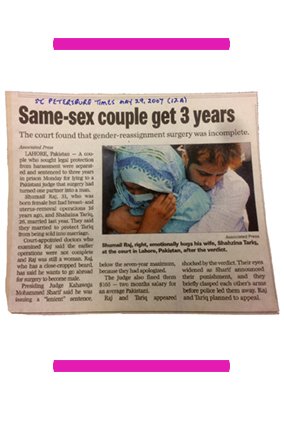In dis/patches from the Foreign Office, Trans Collection Project Assistant Sajdeep Soomal explores newspaper articles, legal cases, and other ephemera stored in The ArQuives’s international collection. Issue 1 Rights for Rites: Transgender Marriage in Pakistan  There are eight folders labeled “Pakistan” at The ArQuives. Stored within the international vertical files, they are tightly packed between Norway and Palestine. Tempted by the bookends, I flipped through clipped newspaper articles that praised antidiscrimination laws in Norway while speculating on Yasser Arafat’s sexuality. The liberal anxieties and dreams that underwrite the terms and conditions for global LGBTQ liberation are immediately palatable in these files. The first folder, aptly titled “Pakistan (General),” covers the basics of gender and sexuality across the postcolonial nation. There are reports about legal cases involving gay and lesbian Pakistani asylum seekers. A few printed newspaper articles push back against a view of Pakistan as “socially conservative” and “backward,” extolling gay life in the major cities of Lahore and Karachi. One article reveals how life is “not-so-gay” in the capital, detailing the norms that undergird sex between men across the cosmopolitan geographies of Pakistan. Another titled “No safe sex for Pakistan,” links together landscapes of environmental degradation, prostitution, and HIV/AIDS to uphold racist discourses of the Asian city as a dirty and overpopulated viral incubator. There are emails and articles that reveal the difficulties of sexual life in the North-West Frontier Province (now Khyber Pakhtunkhwa) and the semi-autonomous Federally Administered Tribal Areas. Beyond the sex lives of Pakistani men, there are a splattering of newspaper articles about the lives of hijras, as well as one folder dedicated to a popular legal case involving a transgender man named Shumail Raj and his wife, Shahzina Tariq. The case is well-documented in the Delhi-based magazine in plainspeak. In the archives, you get a watered down version of the story, accompanied by an unusually striking photograph. In the struggle for refuge, time stops as Shumail holds his wife tight. Averted eyes and tense bodies are incarcerated in the photograph, reminding us that queer intimacy is always adjudicated in public courts.
There are eight folders labeled “Pakistan” at The ArQuives. Stored within the international vertical files, they are tightly packed between Norway and Palestine. Tempted by the bookends, I flipped through clipped newspaper articles that praised antidiscrimination laws in Norway while speculating on Yasser Arafat’s sexuality. The liberal anxieties and dreams that underwrite the terms and conditions for global LGBTQ liberation are immediately palatable in these files. The first folder, aptly titled “Pakistan (General),” covers the basics of gender and sexuality across the postcolonial nation. There are reports about legal cases involving gay and lesbian Pakistani asylum seekers. A few printed newspaper articles push back against a view of Pakistan as “socially conservative” and “backward,” extolling gay life in the major cities of Lahore and Karachi. One article reveals how life is “not-so-gay” in the capital, detailing the norms that undergird sex between men across the cosmopolitan geographies of Pakistan. Another titled “No safe sex for Pakistan,” links together landscapes of environmental degradation, prostitution, and HIV/AIDS to uphold racist discourses of the Asian city as a dirty and overpopulated viral incubator. There are emails and articles that reveal the difficulties of sexual life in the North-West Frontier Province (now Khyber Pakhtunkhwa) and the semi-autonomous Federally Administered Tribal Areas. Beyond the sex lives of Pakistani men, there are a splattering of newspaper articles about the lives of hijras, as well as one folder dedicated to a popular legal case involving a transgender man named Shumail Raj and his wife, Shahzina Tariq. The case is well-documented in the Delhi-based magazine in plainspeak. In the archives, you get a watered down version of the story, accompanied by an unusually striking photograph. In the struggle for refuge, time stops as Shumail holds his wife tight. Averted eyes and tense bodies are incarcerated in the photograph, reminding us that queer intimacy is always adjudicated in public courts.

